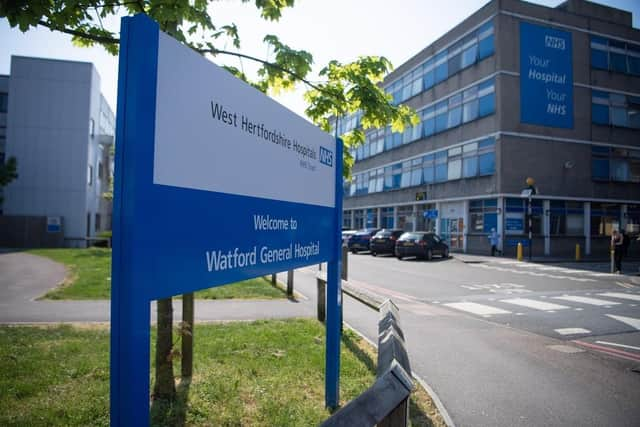NHS warns of 'significant disruption' to services in Herts including Watford General ahead of strikes
and live on Freeview channel 276
The NHS has released a warning to residents in the Hertfordshire area ahead of three planned days of strike action.
A three-day junior doctors’ strike is likely to cause ‘significant disruption’ to NHS services in Hertfordshire and West Essex, the body warns.
Advertisement
Advertisement
Industrial action begins on Wednesday 14 June and ends at 7am on Saturday 17 June.


But the NHS warns services may be disrupted immediately before and after the strikes.
Accident and emergency departments at Princess Alexandra Hospital in Harlow, Lister Hospital in Stevenage and Watford General Hospital, should only be attended by people with very serious injuries or illnesses, the NHS states.
People should still attend appointments at hospitals and clinics, unless specifically told not to by health staff.
Advertisement
Advertisement
Dr Jane Halpin, chief executive of Hertfordshire and West Essex Integrated Care Board (ICB) said: “The junior doctors’ strike will present many challenges to patients, our hospitals, and some of our GP practices too. With only around one third of all doctors expected to be working, hospitals will not be able to run as normal and services will be working under immense pressure over several days.
“Even with the careful planning that is taking place, both routine and emergency care are likely to be significantly affected. In order to prioritise life-saving emergency treatment for people who need it, hospitals will postpone some non-urgent operations, treatments and routine appointments. Where this is the case, patients will be contacted directly.
"This is really unfortunate for those whose treatment is delayed, but with the majority of doctors not working, remaining staff must cover the essential care patients need.
“During the last strike action in April, some people came to A&E with symptoms that should have been seen and treated elsewhere. A&E is always for serious injuries and life-threatening emergencies only, so in a genuine medical emergency always call 999. There are many sources of advice about when to call 999, including on the NHS website.
Advertisement
Advertisement
"If you come to A&E with a minor condition or illness during the strike, you are likely to face a very long wait. If you call 999 for an ambulance when you don’t need one, you could endanger the life of another person in desperate need of emergency care. NHS 111 is there 24 hours a day if you or a family member are unwell and need urgent medical help or advice on where to go. We have more staff in the NHS 111 service to cover this challenging week, so please use 111 online or by phone if you cannot manage symptoms yourself at home.
“I would like to thank everyone for their understanding and support at this challenging time.”
Self-help advice and details on each service provided by the ICB can be found on its website here.
Union-affiliated NHS staff are striking over pay which has fallen by 27 per cent since 2008 when accounting for inflation.
So far the British Medical Association has been unable to reach an agreement with the Government over doctors’ pay.